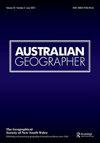Geographies, mobilities and politics for disabled people: power-assisted device practice
IF 2
2区 社会学
Q2 GEOGRAPHY
引用次数: 0
Abstract
ABSTRACT In this paper, key findings are presented from an Australian Research Council (ARC) Linkage project that investigated the geographies, mobilities and politics for disabled people who roll powered assisted devices (wheelchairs and mobility scooters). We offer a spatial framework to think about the politics of exclusion/inclusion from public space along three dimensions: as a distributed institutional decision-making process, as personal, and as an event/journey. We recruited 68 disabled people to collaborate in a multi-stage, mixed-method qualitative project from 2020–2022. Four themes emerged from our thematic analysis of everyday power-assisted device practices that offer insights to what enables or constrains access to public space: the desire for social connections and independence, normative assumptions of standing design, the built form when going places (steps, gutters and stairs) alongside the interdependencies of various care and transport networks. We point to the implications for policy, planning and future research.残疾人的地理、行动和政治:动力辅助装置的实践
本文章由计算机程序翻译,如有差异,请以英文原文为准。
求助全文
约1分钟内获得全文
求助全文
来源期刊

Australian Geographer
GEOGRAPHY-
CiteScore
4.10
自引率
8.30%
发文量
33
期刊介绍:
Australian Geographer was founded in 1928 and is the nation"s oldest geographical journal. It is a high standard, refereed general geography journal covering all aspects of the discipline, both human and physical. While papers concerning any aspect of geography are considered for publication, the journal focuses primarily on two areas of research: •Australia and its world region, including developments, issues and policies in Australia, the western Pacific, the Indian Ocean, Asia and Antarctica. •Environmental studies, particularly the biophysical environment and human interaction with it.
 求助内容:
求助内容: 应助结果提醒方式:
应助结果提醒方式:


